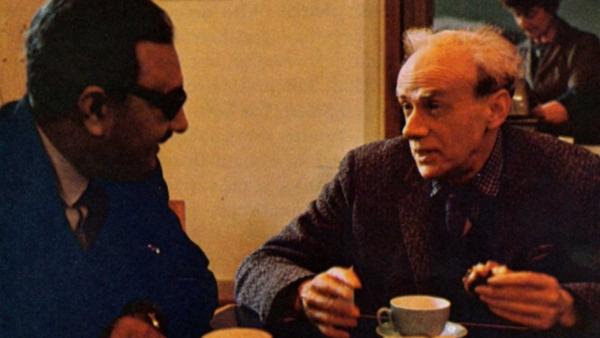ICTP's Dirac Medal, first awarded in 1985, is given in honour of P.A.M. Dirac, one of the greatest physicists of the 20th century and a staunch friend of the Centre. It is awarded annually on Dirac's birthday, 8 August, to scientists who have made significant contributions to theoretical physics.
An international committee of distinguished scientists (Alessandra Buonanno, Atish Dabholkar (chair), David Gross, Juan Maldacena, Giorgio Parisi, Subir Sachdev, Peter Zoller) selects the winners from a list of nominated candidates.
P.A.M. Dirac
One of the greatest physicists of the 20th century and a staunch friend of ICTP

Paul Adrien Maurice Dirac was born in Bristol, England on 8 August 1902. He studied engineering in his hometown, and obtained his degree in physics and mathematics at Cambridge University where in 1932 he became Professor of Mathematics in the Lucasian Chair, which had been held by Sir Isaac Newton two centuries earlier. After his retirement, Professor Dirac went to live in Tallahassee, Florida, where he taught at Florida State University from 1971 until his death on 20 October 1984.
A Member of the Royal Society since 1930, he won the Royal Medal in 1939 and the Copley Medal in 1952. Professor Dirac shared the Nobel Prize for Physics with E. Schrödinger in 1933. He invented the well-known relativistic wave equation predicting the existence of spin and of the positron when he was only 23 years old. His further work includes his formulations of quantum field theory, statistics of fields and particles, gravitational waves and the prediction of magnetic monopoles.
Dirac first came to Trieste in June 1968 on the occasion of the International Symposium on Contemporary Physics at which he delivered a lecture on the methods of theoretical physics. After this symposium, Dirac was a guest of honour at the Centre for a month or so nearly every year. In 1972, at a symposium on The Physicists's Conception of Nature organised in honour of Dirac on the occasion of his 70th birthday, he gave a lecture on Fundamental Constants and their Development in Time. Dirac also attended the Marcel Grossman Meeting held at the Centre on the centennial of the birth of Albert Einstein in 1979.
Abdus Salam, who proposed the institution of the Dirac Medal, was Dirac's student at Cambridge and it was after having listened to Dirac's lectures that he decided to devote his life to research rather than becoming a civil servant in his country. He remained in touch with his master and became his friend.
Nominations can be submitted online. One or more scientists can be nominated. Information including name, address, institute, email etc. are required in the online nomination form (for both the nominator and the nominee); the nominee's short CV, short list of publications, and reference/support letters are also required and can be uploaded in pdf format. A citation is also requested.
The Dirac Medal is not awarded to Nobel Laureates, Fields Medallists, or Wolf Foundation Prize winners, although many Dirac Medallists have proceeded to win these prestigious prizes. The full list of past winners, including their award citations, is available below.
For further information, please write to director@ictp.it.
















